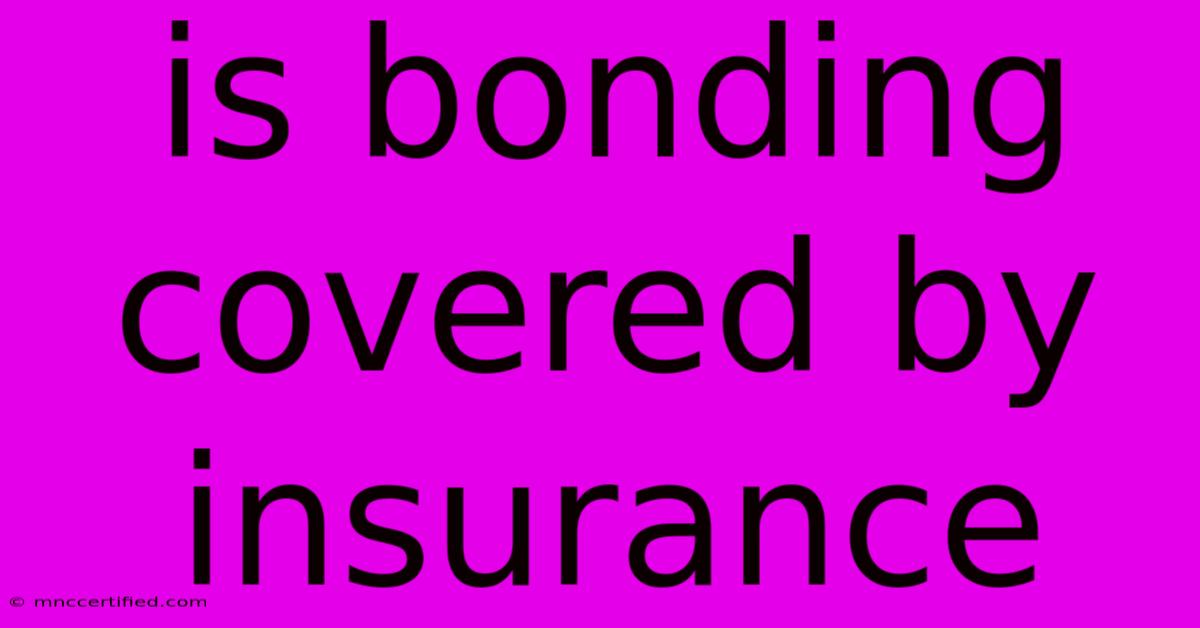Is Bonding Covered By Insurance

Table of Contents
Is Bonding Covered by Insurance? A Comprehensive Guide
Many people confuse bonding with insurance, but they are distinct financial instruments. While both offer protection against financial loss, they do so in fundamentally different ways. This article will clarify the differences and explore whether bonding is covered under various insurance policies.
Understanding Surety Bonds vs. Insurance Policies
The crucial difference lies in who is protected. Insurance protects the policyholder from their own losses or liabilities. For example, car insurance protects you from financial losses due to accidents. Surety bonds, on the other hand, protect a third party (the obligee) from the potential failure of a principal (the bond applicant) to fulfill a contractual obligation. The surety company guarantees the principal's performance.
Think of it this way: insurance is about your risk, while a bond is about someone else's risk to you.
Key Differences Summarized:
| Feature | Insurance | Surety Bond |
|---|---|---|
| Purpose | Protects against your own losses | Protects a third party from your failures |
| Payment Trigger | Your loss or liability | Your failure to fulfill a contractual obligation |
| Claim Process | You file a claim against your insurer | The obligee files a claim against the surety |
Types of Bonds and Coverage
Several types of bonds exist, each serving a specific purpose. These include:
- Contract Bonds: These guarantee a contractor's performance on a construction project, protecting the project owner. This is a common type of bond.
- Fidelity Bonds: Protect employers from employee dishonesty, such as embezzlement or fraud.
- License and Permit Bonds: Required by many licensing authorities to ensure compliance with regulations.
- Court Bonds: Used in legal proceedings, such as bail bonds or probate bonds.
Crucially, surety bonds are not typically covered by standard insurance policies. You purchase a surety bond separately. A homeowner's or business insurance policy will not cover the cost of a surety bond needed for a project or license.
Can Insurance Indirectly Help with Bond Costs?
While bonds themselves aren't covered, some insurance policies might indirectly influence your ability to obtain one or manage its cost:
- Good Credit: A strong credit history is crucial for obtaining a surety bond at a favorable rate. Maintaining good credit, which can be supported by responsible financial planning and insurance, helps.
- Business Insurance: Comprehensive business insurance demonstrates financial stability and risk management, potentially making you a lower-risk applicant for a bond.
- Professional Liability Insurance (Errors & Omissions): For professionals like contractors or consultants, having professional liability insurance can mitigate potential losses, potentially affecting your bond premiums.
Finding the Right Surety Bond
Obtaining a surety bond involves applying through a surety company. The cost of the bond, known as the premium, is determined by several factors, including:
- Your credit score: A higher credit score generally means a lower premium.
- The type of bond: Different bonds carry different risk levels and associated premiums.
- The bond amount: The higher the bond amount, the higher the premium.
- Your financial history: Your overall financial health plays a crucial role in the surety company’s assessment.
Conclusion: Bonds are Separate from Insurance
In summary, surety bonds are not typically covered by insurance. They are distinct financial instruments with a different purpose and structure. While your insurance policies may indirectly improve your chances of obtaining a bond at a reasonable rate, you need to purchase a bond separately. Understanding the difference between insurance and bonding is essential for responsible financial management. Always consult with a licensed insurance professional or surety bond specialist for personalized advice.

Thank you for visiting our website wich cover about Is Bonding Covered By Insurance. We hope the information provided has been useful to you. Feel free to contact us if you have any questions or need further assistance. See you next time and dont miss to bookmark.
Featured Posts
-
E On Compensation 14 5 M Meter Fault
Nov 22, 2024
-
Pratt Predicts Bengals Win Vs Steelers
Nov 22, 2024
-
Juventus 0 1 Arsenal Match Recap
Nov 22, 2024
-
Rooney Solo Coleens Jungle Adventure
Nov 22, 2024
-
Ionic Bonds Practice Answer Key
Nov 22, 2024